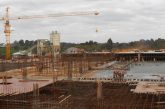
Kenyans will have to pay to use the Nairobi Expressway when it is complete. This is after the Cabinet Secretary for Transport, Infrastructure, Housing, and Urban Development James Macharia officially gazetted it as a toll road.
Courtesy of a gazette notice dated December 31, this announcement takes effect with immediate effect, although the suspended expressway will be completed in December 2022. The notice confirmed that the toll roads begin from African Inland Church, Mlolongo and it runs in the central reserve all the way to James Gichuru road. The road is still under construction and is expected to be complete by early 2022.
“In exercise of the powers conferred by section 3 (2A) of the Public Roads Toll Act, (Cap 407), the dual carriageway with Class A standard that connects the Mlolongo with James Gichuru road along the median strip of the A8 National Road are declared to be Toll Roads with immediate effect,” read part of the notice.
Daily toll charge
The amount of daily toll charge to be paid was not confirmed though previous reports indicated that motorists would part pay between Ksh100 and Ksh1,600 depending on the type of vehicle. Ambulances, police vehicles, and military vehicles will be exempted from paying the prescribed tolls.
The Nairobi Expressway Project is a 27-kilometer road project beginning from Mlolongo through the Jomo Kenyatta International Airport (JKIA) and Nairobi’s CBD to Westland’s area along Waiyaki Way. The project involves a four-lane and six-lane dual carriageway within the existing median of Mombasa Road/Uhuru Highway/Waiyaki Way and 10 interchanges.
The project broke grounds in October last year with China Road and Bridge Corporation (CRBC) as the contractor. The latter is responsible for the design, financing, and construction of the road under a Public-Private Partnership (PPP) framework. The company will also operate the road for about 27 years so as to recoup its investment through the collection of road tolls.
The contractor has installed over 69 pillars and earthworks along the stretch. A section of the road from Mlolongo all the way to NextGen Mall, a distance of 18.2 kilometres and which is ongoing, will be a flatbed road, while the section from Nextgen Mall through the City-Centre to St Marks church, covering 8.2 kilometres, will be elevated.
The toll charges will be kept in a special fund to finance maintenance of the highways and repayment of other roads built by private contractors but fail to generate enough funds to pay investors due to low number of users.





